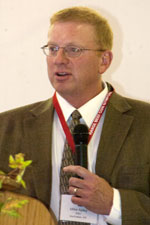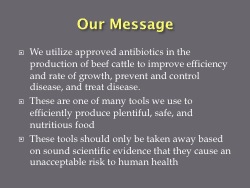Antibiotics Issue Must Remain
Science-based
by Kindra Gordon for Angus Productions Inc.
MITCHELL, Neb. (Nov. 29, 2011) — Kansas State University veterinarian and professor Mike Apley urged beef producers to stay vigilant on the issue of restricting use of subtherapeutic antibiotics in food animals as he addressed attendees at the Range Beef Cow Symposium XXII in Mitchell, Neb.

Mike Apley said the industry must continue to encourage regulators to make science-based decisions in determining allowable uses of antibiotics in food animals.
The Food and Drug Administration (FDA) and the Center for Veterinary Medicine (CVM) have approved antimicrobial use in food animals for increased rate of gain; increased feed efficiency; and disease prevention, control and treatment.
Do these uses in food animals have an effect down the road on humans? Apley shared that research has shown use of antibiotics in food animals has a very minimal effect on humans. “I assure you the vast majority of resistance issues are not food animal-related. There can be a small incidence, but it is few and far between,” he stated.
However, a misconception persists among consumers that antibiotics used in livestock make human diseases harder to cure. As a result, the classifications of prevention and treatment — which are considered “subtherapeutic” uses in food animals — are being targeted for restricted use, Apley reported.
He urged the industry to continue fighting this, saying, “If we lop off the most politically acceptable category to ‘cut down use,’ then we end up with a precedent of the precautionary principle for addressing the much more important, and in my mind the more likely to have an effect on prevention and control claims.”
Apley said the industry must continue to encourage regulators to do their job and make science-based decisions on this issue.
He shared that Guidance 209 from the FDA/CVM is currently out for comment. It sets forth two principles:
- The use of medically important antimicrobial drugs in food-producing animals should be limited to those uses that are considered necessary for assuring animal health.
- The use of medically important antimicrobial drugs in food-producing animals should be limited to those uses that include veterinary oversight or consultation.
“It is clear cut that in the future, a veterinarian will need to be involved in antibiotic use actions with livestock,” Apley said.
 Also being discussed in the legislature is HR 1549 Preservation of Antimicrobials for Medical Treatment Act, known as the PAMTA bill. It has been in discussion for several years, and would essentially ban the “subtherapeutic” use of seven classes of antimicrobials in food animals. Apley feels the bill does not currently have much traction, but says it is legislation the industry must continue to monitor.
Also being discussed in the legislature is HR 1549 Preservation of Antimicrobials for Medical Treatment Act, known as the PAMTA bill. It has been in discussion for several years, and would essentially ban the “subtherapeutic” use of seven classes of antimicrobials in food animals. Apley feels the bill does not currently have much traction, but says it is legislation the industry must continue to monitor.
Going forward, Apley suggested three points the livestock industry must be proactive in sharing with the public:
- 1) We utilize approved antibiotics in the production of beef cattle to improve efficiency and rate of growth, prevent and control disease, and treat disease.
- 2) Antibiotics are one of many tools we use to efficiently produce plentiful, safe and nutritious food.
- 3) These tools should only be taken away based on sound scientific evidence that they cause an unacceptable risk to human health. There are multiple risk assessments out there showing very minimal risk, and the detractors should do their own risk assessments.
To view Appley's PowerPoint presentation, click here.
The biennial Range Beef Cow Symposium was hosted Nov. 29-Dec. 1 at the Mitchell Events Center, Mitchell, Neb., by the cooperative extension and animal science departments of the Univeristy of Nebraska-Lincoln, South Dakota State University, Colorado State University and the Universsiy of Wyoming. Comprehensive coverage of the event is provided online at www.rangebeefcow.com, an event coverage site provided by Angus Productions Inc. (API), publisher of the Angus Journal and the Angus Beef Bulletin.
Editor’s Note: API's coverage of the event is made available for distribution to all media via an agreement with the Range Beef Cow Symposium Committee and API. Headquartered in Saint Joseph, Mo., API publishes the Angus Journal, the Angus Beef Bulletin, the Angus Beef Bulletin EXTRA, and the Angus e-List, as well as providing online coverage of events and topics pertinent to cattlemen through the API Virtual Library. For questions about this site, or to notifiy us of broken links, click here.

